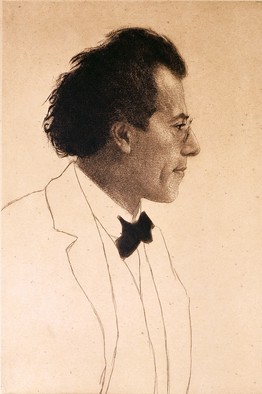 The tradition of performing music in reduced orchestrations goes back a long way. In the 19th century, most orchestral music was also arranged for piano duet. This was often how people got to know the orchestral repertoire before the days of recordings. During the second decade of the 20th century, the composer Arnold Schoenberg set up the Verein für musikalische Privataufführungen (“Society for Private Musical Performances”). The main purpose of this organisation was to enable him and his colleagues to perform their new works in an environment free from an aggressive public and hostile critics. As well as performing their own works they made arrangements of works by other composers for chamber ensemble. It was here that the arrangement of Debussy’s Prélude à l’après-midi d’un faune, which the Mahler Players performed in June 2013, was first heard. Schoenberg, a huge admirer of Mahler, also supervised arrangements of some of Mahler’s works, including the Fourth Symphony (arranged by his pupil Erwin Stein) and Das Lied von der Erde.
The tradition of performing music in reduced orchestrations goes back a long way. In the 19th century, most orchestral music was also arranged for piano duet. This was often how people got to know the orchestral repertoire before the days of recordings. During the second decade of the 20th century, the composer Arnold Schoenberg set up the Verein für musikalische Privataufführungen (“Society for Private Musical Performances”). The main purpose of this organisation was to enable him and his colleagues to perform their new works in an environment free from an aggressive public and hostile critics. As well as performing their own works they made arrangements of works by other composers for chamber ensemble. It was here that the arrangement of Debussy’s Prélude à l’après-midi d’un faune, which the Mahler Players performed in June 2013, was first heard. Schoenberg, a huge admirer of Mahler, also supervised arrangements of some of Mahler’s works, including the Fourth Symphony (arranged by his pupil Erwin Stein) and Das Lied von der Erde.
Whilst technology has made it possible for people anywhere in the world to listen to whatever they want on demand, the access to live performance in a place like the Highlands of Scotland is still relatively limited, particularly with this repertoire. We are therefore very lucky to have these arrangements. Mahler is a composer who many people associate with huge combined orchestras and choirs. Whilst those works with choir such as the 8th, and also the 2nd and 3rd symphonies are almost unimaginable for a chamber ensemble, a great many of Mahler’s works are particularly suited to a smaller group. Much of Mahler’s writing uses the orchestra in a very chamber-like way and the passages which do require large forces in the originals, although they may lose some of their raw power, can still be given the same or more intensity by the players. The results can be astonishing, as one reviewer commented: “by the beginning of the slow movement of Mahler’s Fourth I’d pretty much forgotten that this was a reduced version”.
With Mahler in Miniature we believe we are offering something of enormous value to audiences in the Highlands. We are operating at the cutting edge of classical music, with many of the arrangements we use having been made within the last five years. We are allowing those who already know and love Mahler’s music to hear it in a completely new way. We are opening up opportunities for those who have not heard his music to do so for the first time. Many of the players in the ensemble are able to pinpoint the first time they heard Mahler’s music and identify it as a life changing moment and the beginning of an extraordinary journey. We hope very much that we will be able to offer this journey to our audiences too.
